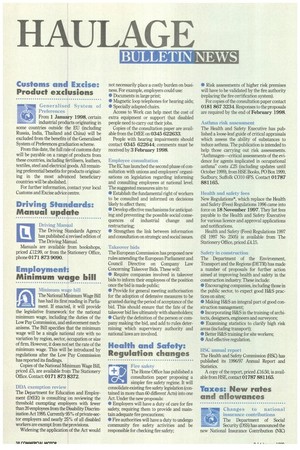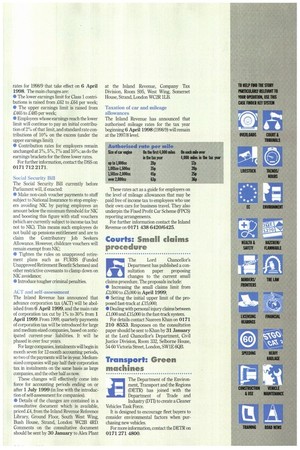Taxes: New rates and allowances „Ii,L,RL-w Changes to national insurance
Page 40

Page 41

If you've noticed an error in this article please click here to report it so we can fix it.
contributions 3 The Department of Social Security ()SS) has announced the new National Insurance Contribution (MC) rates for 1998/9 that take effect on 6 April 1998. The main changes are:
• The lower earnings limit for Class 1 contributions is raised from £62 to £64 per week; • The upper earnings limit is raised from £465 to £485 per week; • Employees whose earnings reach the lower limit will continue to pay an initial contribution of 2% of that limit, and standard rate contributions of 10% on the excess (under the upper earnings limit); • Contribution rates for employers remain unchanged at 3%, 5%, 7% arid 10%; as do the earnings brackets for the three lower rates, For further information, contact the DSS on 0171 712 2171.
Social Security Bill
The Social Security Bill currently before Parliament will, if enacted-.
• Make non-cash voucher payments to staff subject to National Insurance to stop employers avoiding MC by paying employees an amount below the minimum threshold for MC and boosting this figure with staff vouchers (which are currently subject to income tax but not to MC). This means such employees do not build up pensions entitlement and are to claim the Contributory Job Seekers Allowance. However, childcare vouchers will remain exempt from MC; • Tighten the rules on unapproved retirement plans such as FURl3S (Funded Unapproved Retirement Benefit Schemes) and other restrictive covenants to clamp down on MC avoidance; • Introduce tougher criminal penalties.
ACT and self -assessment
The Inland Revenue has announced that advance corporation tax (ACT) will be abolished from 6 April 1999, and the main rate of corporation tax cut by 1% to 30% from 1 April 1999. From 1999, quarterly payments of corporation tax will be introduced for large and medium-sized companies, based on anticipated current-year liabilities. It will be phased in over four years.
For large companies, instalments will begin in month seven for 12-month accounting periods, so two of the payments will be in-year. Mediumsized companies will pay half their corporation tax in instalments on the same basis as large companies, and the other half as now.
These changes will effectively come into force for accounting periods ending on or after 1 July 1999 (in line with the introduction of self-assessment for companies).
• Details of the changes are contained in a consultative document which is available, priced £4, from the Inland Revenue Reference Library, Ground Floor, South West Wing, Bush House, Strand, London WC2B 4R11 Comments on the consultative document should be sent by 30 January to Alex Plant
at the Inland Revenue, Company Tax Division, Room S95, West Wing, Somerset House, Strand, London WC2R 1113.
Taxation of car and mileage allowances
The Inland Revenue has announced that authorised mileage rates for the tax year beginning 6 April 1998(1998/9) will remain at the 1997/8 level.
These rates act as a guide for employers on the level of mileage allowances that may be paid free of income tax to employees who use their own cars for business travel They also underpin the Fixed Profit Car Scheme (FPCS) reporting arrangements.
For further information contact the Inland Revenue on 0171 438 6420/6425.
































































































